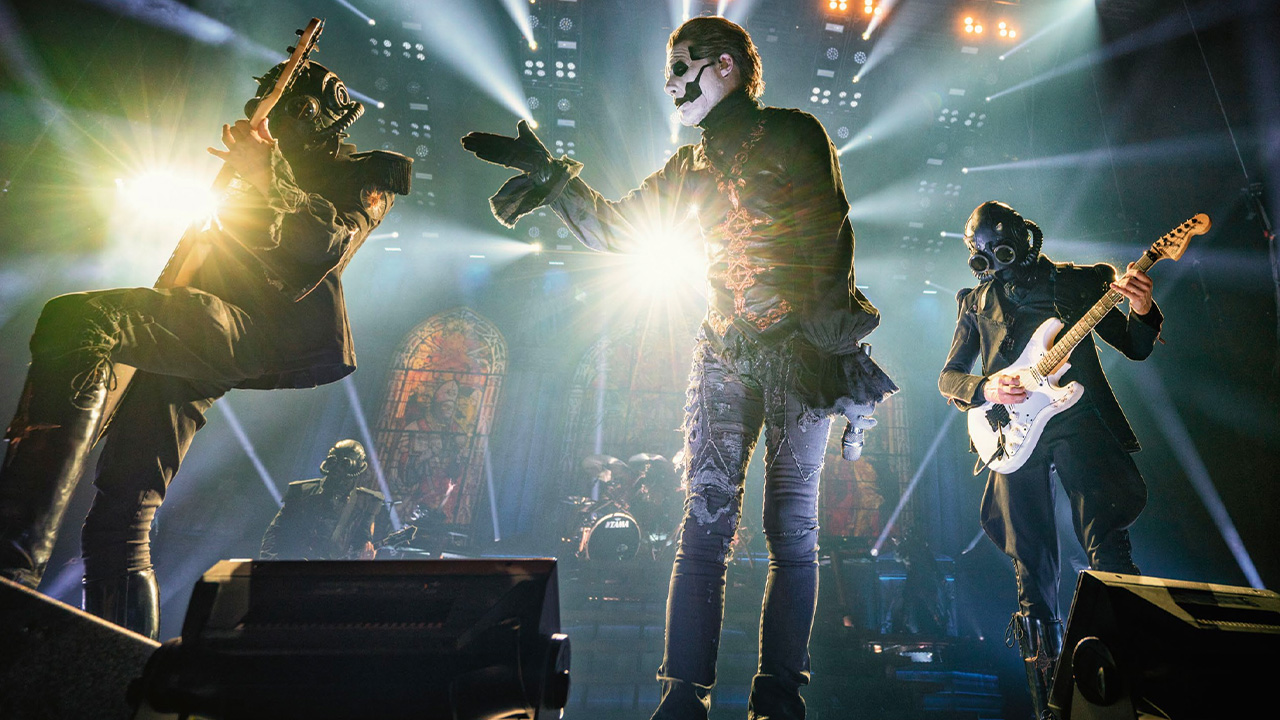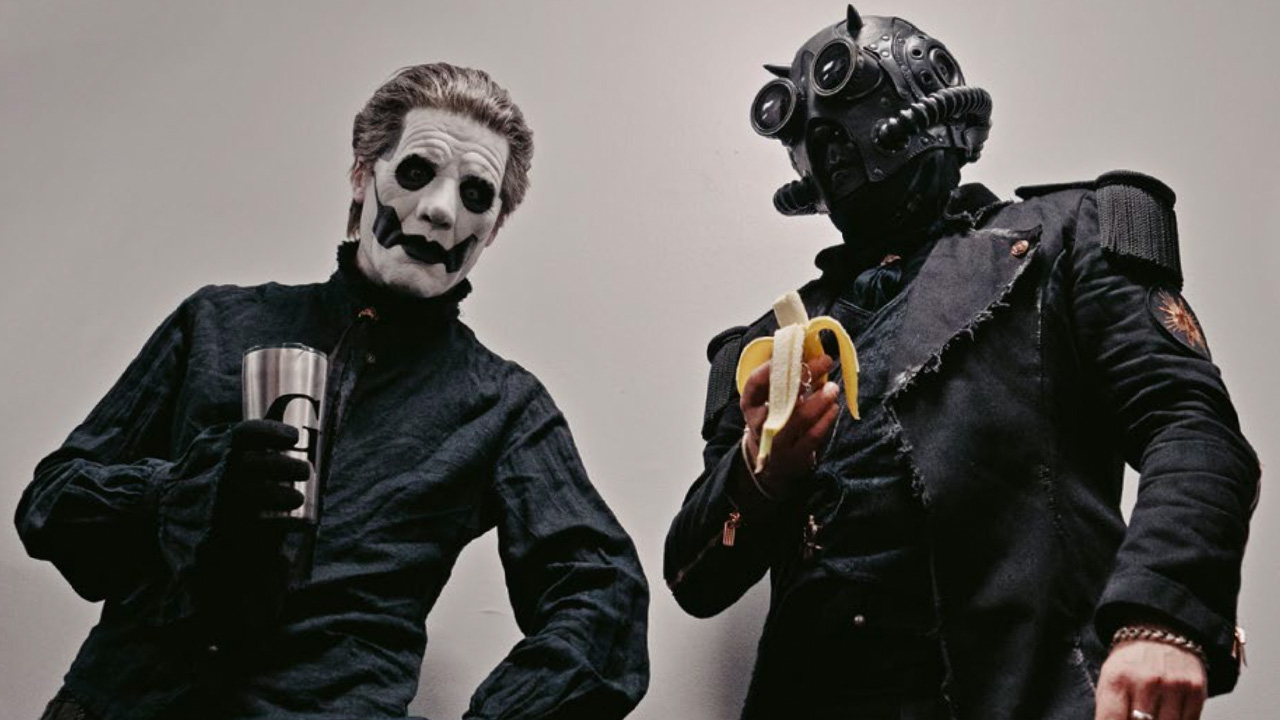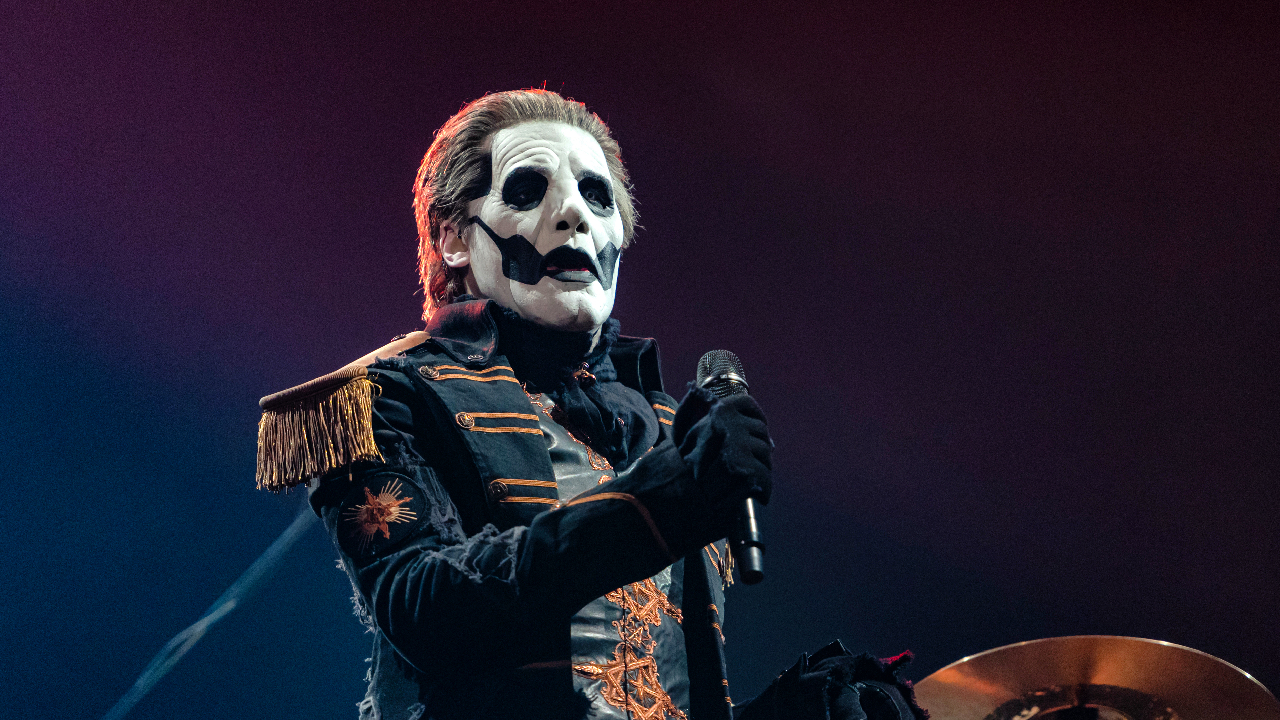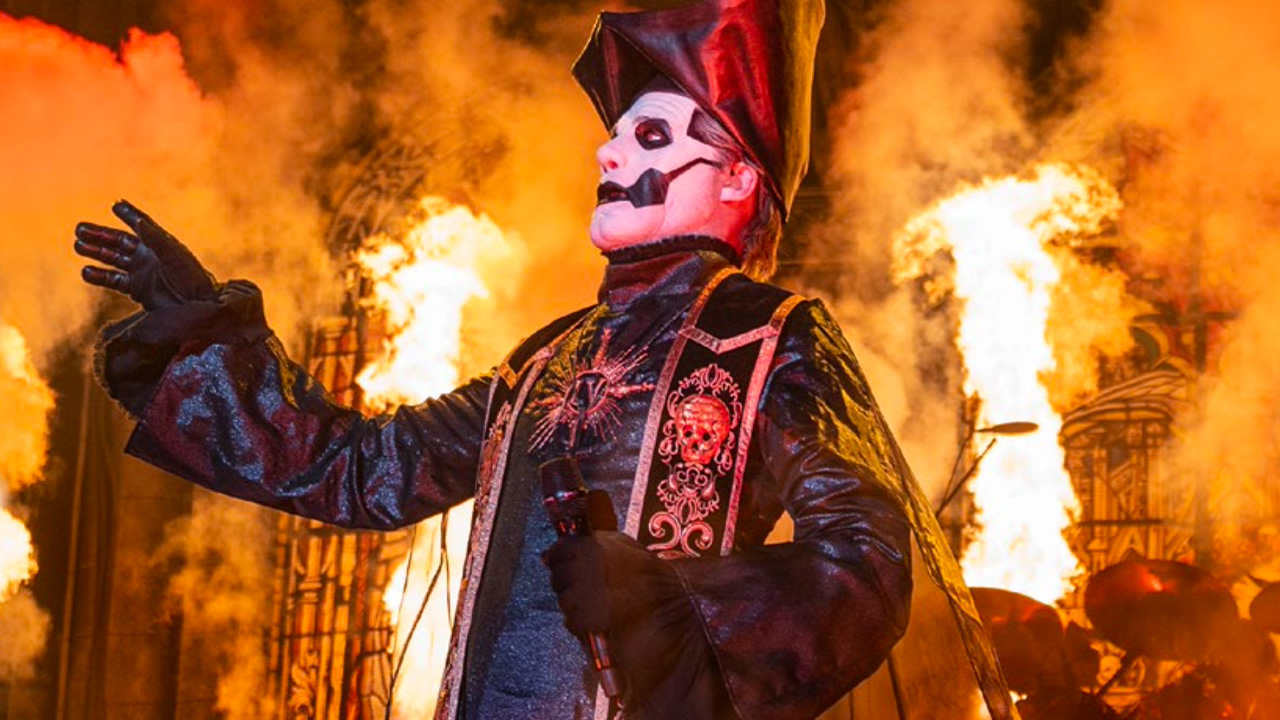The choral swells of Gregorio Allegri’s Miserere Mei, Deus drift through the audience at Manchester Arena. It’s Saturday night, the mood is high and a cathedral is being built on stage.
Behind the curtain, we catch glimpses of the sort of theatre normally associated with the Iron Maidens, Rammsteins and Alice Coopers of this world. Giant steps. High walls and arches. Ornate stained glass window backdrops. More dry ice than Kate Bush’s Wuthering Heights video, dotted with a scattering of men in hard hats. Stonehenge this is not.
The curtain drops. The opening guitar glitter of Kaisarion bursts into our faces. Punters wearing nuns’ habits, crucifixes and corpse paint gaze up like children in a sweet shop, while Nameless Ghouls in gas masks are illuminated by cracking pyrotechnics. As riffs and drum thunder roll out like groovy cavalry, marrying heavy mystique with Def Leppard-sized hooks, it’s easy to see why Metallica and Dave Grohl are fans.
The most rapturous applause, though, is reserved for their mercurial leader. An impishly charismatic figure, masked by black-and- white face paint. Hair slicked back with grey. Microphone in hand.
Part Victorian military dandy, part Joel Grey’s MC from Cabaret in tight black skinny jeans and black leather gloves, Papa Emeritus IV strides, skips and gesticulates with the precision and campery of a seasoned Broadway star. And although there are thousands watching, those painted eyes of his have an oddly penetrative, Mona Lisa-esque effect. All-seeing. It’s as if he’s looking at you.
Welcome to the Ghost show.

A few hours earlier we’re in a Grade II-listed hotel on Manchester’s Oxford Road, lifting an armchair with a short, polite Swedish guy in a band T-shirt. Silver chains clink at his wrists. A skull ring hulks round one finger. His generously spiked hair is jet-black, contrasting with almost bloodless skin. He could have wandered in from one of the rock pubs across the road.
“Master,” Tobias Forge says with a smile, pulling back his jacket, when asked about the T-shirt. “They’re an American eighties death metal band. They’re not very good, but they’re cool!”
It’s surreal to think that this is the man who will slink across the stage as Papa Emeritus IV tonight (the latest incarnation of Forge’s fictitious, ecclesiastical one-man dynasty). The 41-year-old conductor at the heart of the 700 cues, 45 or so crew members and four tour buses that make up the Ghost experience; a production that, in some ways, feels more akin to the Cirque Du Soleil than to a rock show.
It’s a globetrotting colossus, following its doomy, cultish origins in Linköping, Sweden in 2006.
“Some people prefer ad-hoc rock bands like Pearl Jam or Springsteen, who come up on stage in whatever they wore on the street and just start playing,” he says, quickly adding: “which I love; I love Pearl Jam, I love Bruce Springsteen. But that’s not what we do. We don’t improvise that much. A lot of the show is free-form, which makes it edgy, but there’s still a script.”
Having released a gloriously grandiose new album, Impera, Ghost returned to the live circuit this year as co-headliners with Volbeat in the USA, causing some political “head-butting” when Ghost went on second every night. As Forge implies, they are not so much ‘hard to follow’ as logistically impossible. Now, at the start of this European tour, they’re very much on top – with Uncle Acid & The Deadbeats and Twin Temple in support slots.
“Co-billing for us is not necessarily a great thing,” Forge reasons, carefully. “What we’re doing is not compatible with many other bands. Not necessarily the sound; I don’t see a problem for a fan to absorb both. But if it’s going to be a forty-five-minute changeover, is that great for the crowd that paid for these tickets? I can order ten courses I really like, but I can only eat one. I’m not sure it’s doing the desired trick.”

There’s a cool flash of fanaticism about Forge, just detectable behind his approachable demeanour. He looks you straight in the eye. He pauses to consider his answers. During our conversation he’ll compare putting on a show to a football season, making a film, running a restaurant and going to war. All are analogies he’s used before, and all support the sense of auteurship that ripples through the Ghost world (as well as echoing Forge’s own fondness for sports, Stanley Kubrick and good food).
But there are other sides to him. The geeky classic-rock lover, who watches live Queen and Iron Maiden clips to get pumped before shows. The guy who on tour goes out to football and hockey games. The arty urbanite with friends in music, film and amusement parks back home in Stockholm. The happily married father of teenage twins, who binge-watched The Sopranos, Game Of Thrones and Stranger Things with his family over lockdown. The reluctant frontman who, if he had his way, would be Ghost’s guitarist. “But that’s like complaining about not being the general because you got to be the king instead. I would have felt more fluid being the guitar player, but the difference would have been that, mask or no mask, my on-stage persona would have been closer to my real one – my actual one, my private one – than it is nowadays.”
Over at the arena, the gap between those personas increases. As Impera’s lead single Call Me Little Sunshine starts up, Papa returns in glittering cardinal’s robes. He looks like a Christmas tree. Freddie Mercury via the Vatican. Liberace for the holy orders.
Back home, conversely, Forge marvels at the chops of friends like Fredrik Åkesson, Opeth’s lead guitarist, who played on Impera, embellishing the whole record with splashes of virtuosic, 80s-rocking flair.
“I mourn the fact I get to play the guitar so little over the course of my life, because I love playing,” Forge says, twisting his skull ring, “and I think I am a better musician than I am a singer. I just happen to be a good singer in Ghost.”
A self-described jack of all trades, the place you’re most likely to find Forge, on tour, is behind a drum kit. Backstage he pounds through Top 40 hits as part of a mobile workout regimen. Foreigner’s Urgent, Carry On Wayward Son by Kansas, Lenny Kravitz’s Are You Gonna Go My Way? and The Guess Who’s American Woman are all on his go-to list.
In the past he relished the travel aspect of band life, ducking out to explore new sites and record shops. So much so that it began to tire him out, pre-show. Now, he mostly sticks to a strict routine of workouts and walking with audiobooks – most recently Jan Guillou’s Carl Hamilton series, Sweden’s politically astute answer to James Bond. “Ten books, eighteen hours,” he says. “That’s good for ten thousand steps, and you can do calls when you’re walking.”
On stage the seven Nameless Ghouls are in similar ship shape, darting from the menace of From The Pinnacle To The Pit to a galloping Spillways – complete with guitar duels, knowing glances and gestures. Even without facial expressions their performances feel characterful, not to mention being shit-hot on a technical level. It says a lot about them, as people, that they’re happy to be in this group anonymously (there are rumours as to their true identities, but we’ll play the game and not mention those).
For almost a decade Forge was similarly hidden. He spoke to journalists from behind curtains or masks. Officially he only revealed his identity in 2017, following a lawsuit from ex-bandmates. These days, living in a celebrity-heavy pocket of Stockholm (the Skarsgård acting dynasty are among his neighbours) he’s relatively undisturbed, except for any passing rock fans who recognise him from video interviews on YouTube, and a few Google images.

How does that level of visibility sit with him? Does he enjoy doing interviews, for instance, while unmasked?
“I guess from a therapeutic point of view, speaking so much about yourself, your background and your motivation of why you’re doing this, it does have a cathartic function. But I definitely reach a point each day where I don’t want to talk any more. As much as people think that as an artist you like to revel in yourself...” he catches himself. “Look, I’m an exhibitionist, of course, but I definitely get to a point where I get really bummed talking about myself after a while.”
Perhaps this explains the desire to inhabit other personas, and makes sense of his latent acting ambitions. “Yes,” he says with a laugh when asked if there are specific characters he’d love to play, “but I can’t say because it’s part of how I view myself, and that might not rhyme with the rest. As an actor you are working with your physical attributes as your currency, so I know being five foot nine, white, with a certain body shape, I couldn’t do everything on the menu.”
In the Ghost universe, Forge bypasses such restrictions, starring in it and directing the various other parts. Mid-set at Manchester Arena, the audience’s mouths stretch into grins as Papa Nihil – an ancient ‘mentor’ cardinal in aviators – is wheeled out in an open coffin. This was not expected. Supposedly they killed him off in Mexico just before the first lockdown, but here he is,’reanimated’ by stage hands to deliver Miasma’s saxophone solo. It’s all very Alice Cooper, with a dash of Benny Hill.
“I like to compare it to running a restaurant, because people...” Forge searches for the words. “You grew tired of your quiche or whatever a long time ago, even if it’s your grandma’s recipe, but people expect it to taste the same every night because they don’t come in and eat it every day. They expect the quiche to taste the way it did, because they brought two friends with them.”
So what dish would Ghost be?
“Because of the mixed nature of the music that’s combined,” he muses, “I guess it’s a calzone, with sushi in it, with cream on top.”
As the hits keep on coming, they make good on that sushi-calzone-with-cream-on- top concept. The Ghouls storm into Kraken-sized riffer Cirice, and Papa Emeritus reappears in bat wings – because why not?
There are smoke jets, more dry ice, new robes, a fancy hat that (at certain angles) looks a bit like antlers... And then come the flames. Big ones. Fucking loads of them, giving the pyromaniac crews behind Slipknot and Rammstein a run for their money, before leading into He Is – a satirical yet stirring singalong with ABBA in its veins, completed following the suicide of Forge’s friend Selim Lemouchi (of Dutch occult rockers The Devil’s Blood) in 2014. Four years previously, his music-loving older brother died suddenly, the same day the first Ghost songs were released. Death runs deep in this music – in the fortitude it’s taken Forge to run with it.
But they’re not done yet.
The metallic crunch of Mummy Dust is swiftly offset by Papa donning a blue sparkly jacket. “Let me hear you say ‘oomph’!” he roars into the audience, followed by what might be “did you feel it in your pants?!” – but it’s hard to tell through the make-up and an accent that sounds increasingly Compare The Meerkat-esque. Indeed, for all Papa’s suave qualities his stage banter comes with an enchantingly befuddled edge; somewhere between a swashbuckling lothario and a slightly mad pensioner, but less creepy than that sounds. Is this the same softly spoken Scandi guy who chatted earlier about doing his 10,000 steps and watching hockey games?
“We’ve had a good hang!” he declares, by way of a pre-encore ‘farewell’. “I hope you leave feeling... well hung?!”
From there it’s time for a dynamite brace of Enter Sandman (they provided a version for Metallica’s Blacklist guest covers album last year) and Dance Macabre – the least metal song ever recorded by a band with such a metal-friendly image as Ghost.
“Just one more?” Papa shouts to the whooping masses. “And then you go out into the Manchester night, and either you fuck someone, or you go fuck yourself! How about that?”
With that, the band nail an addictive Square Hammer, and the cheers shoot up by several decibels.

Back at the hotel, just before he disappears to gear up for the evening ahead, Tobias Forge considers how it feels when he steps on stage. Transformed. Ready.
“I would say phenomenal,” he replies. “It’s one of the few moments where I don’t think about much else. Most of the time I am thinking of something else. I’m worrying about all kinds of stuff at the same time. The best nights are when you flow through them, and the worst nights are when you think: ‘Oh shit, I forgot the last step, I need to go back,’ and you start thinking about it.”
If that happens tonight, they hide it well. Curtain calls are taken to the pastoral strains of Emmylou Harris’s Sorrow In The Wind, and as Papa and the Ghouls wave, blow kisses and throw plectrums into the adoring audience there’s something reassuringly innocent about it all.
When children learn the truth about Santa Claus, they often keep believing anyway because they want to. They play along with stockings by the chimney, or Dad/Uncle Pete/whoever in the red suit, because it’s more fun that way. The same thing happens with Ghost. Ultimately it’s make-believe. A mystery with a sparkling rock soundtrack.
‘Fun’ can feel like a dismissive term. But as we’ve been reminded tonight, there is power in fun. Power in big, rousing guitars. Power in brilliantly entertaining spectacles. Not least of all, in recent times, fun offers cathartic escape like little else. The means to smile instinctively. Restoration for anyone who’s ever felt crushed by life.
“I would put on Live After Death before going on stage because it takes me near to the dream, rather than thinking of the practical nature of today,” Forge reasons. “That’s what it’s all about. All we’re doing is dreaming.”
Fistfuls of ‘Ghost dollars’ are scattered by roadies as house lights go up, the smell of burning permeates the arena and, finally, we wake up.

